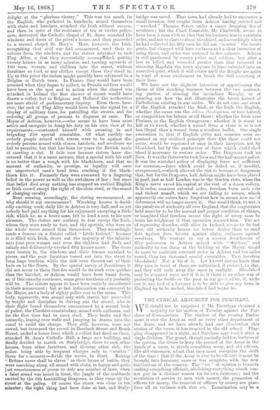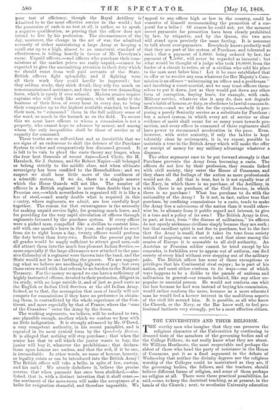THE CYNICAL ARGUMENT FOR PURCHASE.
E should not be surprised if Mr. Trevelyan obtained a
majority for his motion of Tuesday against the Pur- chase of Commissions. The shadow of the coming Parlia- ment is over the Army as well as every other department of the State, and we have already had one illustration this session of the terror it has inspired in the old school. Flog- ging disappeared in a night, and Purchase may vanish after a single division. The grand, though partially hidden, buttress of the system, the desire to keep the control of the Army in the hands of a caste, is slowly crumbling away, and old officers, like old statesmen, admit that they must recognize the drift of the time ; that if the Army is ever to be efficient it must be brought into harmony, more or less complete, with the new institutions of the country. The " set " of opinion is towards making everything efficient, abolishing everything which can- not put in a distinct reason for its own existence ; and the restriction of service to men with money, the promotion of officers for money, the removal of officers by money are prac- tices all at variance with that set. Examination may be a
poor test of efficiency, though the Royal Artillery is admitted to be the most effective service in the world ; but the possession of cash is no test at all, is rather, so to speak, a negative qualification, as proving that the officer does not intend to live by his profession. The circumstances of the day, moreover, the change in the art of war, the admitted necessity of either maintaining a large Army or keeping a small one up to a high, almost to an unnatural, standard of effectiveness, is telling heavily in favour of Mr. Trevelyan's cause. Unpaid officers,—and officers who purchase their com- missions at the market prices are really unpaid,—cannot be expected to give the unremitting attention to their duty which we should exact from well paid servants of the State. British officers fight splendidly, and if fighting were all their work they could hardly be improved ; but they seldom study, they shirk detail, they rely too much on non-commissioned assistance, and they are for ever demanding leave, which is rarely if ever refused. Modern armies require captains who will work like serjeants, who will make it the business of their lives, of every hour in every day, to bring their companies up to the highest available standard, to know their men, to " command" them in the full military sense of the word, as much in the barrack as on the field. To secure this we must have officers to whom a commission is not a property, who cannot hope to advance by money, and among whom the only inequalities shall be those of service or of capacity for command.
These truths are so self-evident and so irresistible that we see signs of an endeavour to shift the defence of the Purchase System to other and comparatively less discussed ground. It is felt to be vain to plead the caste theory any longer, when the four best Generals of recent days—Lord Clyde, Sir H. Havelock, Sir J. Outram, and Sir Robert Napier—all belonged or belong strictly to the middle class, and when ultimate sovereignty has been confided to the Householders ; and we suspect we shall hear little more of the costliness of a scientific system. If we do, there is a simple answer which the Horse Guards will not like. The number of officers in a British regiment is more than double that in a Prussian one,—which nevertheless is organized till it is like a bar of steel,—and nearly double what is required in this country, where regiments, we admit, are less carefully kept together. The reason for that extravagance is the necessity for making unpaid service light, for granting much leave, and for providing for the very rapid circulation of officers through regiments favoured by the purchase system. If every officer were a picked man, compelled like a civilian to content him- self with one month's leave in the year, and expected to tvork from six to eight hours a day, twenty officers would perform the duty better than forty-two. Double the present pay for all grades would be amply sufficient to attract good men,—it did attract them into the much less pleasant Indian Service,— more especially if the large allowances now attached to the pas- sive Colonelcy of a regiment were thrown into the fund, and the State would not be one farthing the poorer. We are suggest- ing what we believe are needlessly high rates of pay ; but even those rates would with that reform be no burden to the National Treasury. For the money we spend we can have a sufficiency of highly instructed officers, devoted to their profession, diligent in its study, with no hope outside it, and of just as good caste as the English or Indian Civil Services or the old Indian Army. Indeed, as to that, the assumption that men of family will not compete for commissions if they have no preference in obtain- ing them, is contradicted by the whole experience of the Con- tinent, and more especially by that of France, where the "sons of the Crusaders " enter the Army by the dozen.
The working arguments, we believe, will be reduced to two, one plausible enough, another which we confess we hear with no little indignation. It is strongly advanced by Mr. O'Dowd, a very competent authority, in his recent pamphlet, and is repeated in its most cynical form by the Quarterly Review. It is alleged that nothing will stop purchase ; that when the senior has that to sell which the junior wants to buy, the junior will buy it, whatever the prohibitions ; that declara- tions upon honour are useless, and that the evil, if it be one, is irremediable. In other words, no sense of honour, honesty, or legality exists or can be introduced into the British Army ! The British officer will take a bribe, in spite of law, custom, and his oath ! We utterly disbelieve it, believe the precise reverse, that when payment has once been abolished,—abo- lished, that is, with a distinct intention that it shall cease,— the sentiment of the mess-room will make the acceptance of a bribe for resignation shameful, and therefore impossible. We
appeal to any officer high or low in the country, could he conceive of himself recommending the promotion of a cor- poral for a bribe ? Of course he could not, yet the moment secret payments for promotion have been clearly prohibited by law, by etiquette, and by the Queen, the two acts will stand upon precisely the same footing. It is nonsense to talk about over-payments. Everybody knows perfectly well that they are part of the system of Purchase, and tolerated as such ; that a payment of 1,0001. being ordered by law, the payment of 1,5001., will never be regarded as immoral ; but what would be thought of a judge who took 10,000/. from the leader of a circuit to retire, or of a civilian who sold his place to the man next below him ? Let it be once established that to offer or to receive any sum whatever for Her Majesty's Com- mission is an offence " unbecoming an officer and a gentleman " and involving a court-martial, and we may trust officers them- selves to put it down, just as they would put down any other form of corruption, buying leave, for example, with cash. Military service, whatever else it may do, does not degrade men's habit of honour, or duty, or obedience to lawful commands. Moreover,—and we add this for the cynics,—nobody is pro- posing a purely Seniority service as a substitute for Purchase ; but a mixed system, in which every act of service or clear evidence of merit shall count for so many years towards pro- motion, and every officer in command of three regiments shall have power to recommend acceleration in the pace. Even, however, with strict seniority, if only the ladder is kept tolerably clear by retirements, it is, we repeat, possible to maintain a tone in the British Army which will make the offer or receipt of money for any military advantage whatever a disgrace.
The other argument sure to be put forward strongly is that Purchase prevents the Army from becoming a caste. The officers do not live by their profession, they remain linked with civil society, they enter the House of Commons, and they share all the feelings of the nation as mere professionals would not do. All that is true, but is it not equally true of the Navy, in which there is no purchase, of the Artillery, in which there is no purchase, of the Civil Service, in which there is no purchase ? What has purchase to do with the nationality of the Army ? Is it not, in fact, rather true that purchase, by confining commissions to a caste, tends to make the Army less a microcosm of the nation than it would other- wise be, to alienate from it public regard and interest, to give it a tone and a policy of its own ? The British Army is free, in part, at least, from " the disease of militarism," its officers do not openly nickname civilians simply because they are such ; but that excellent spirit is not due to purchase, but to the fact that the Army is small, that it takes its tone from society instead of imposing one on society, and that alone among the armies of Europe it is amenable to all civil authority. An Austrian or Prussian soldier cannot be tried except by his comrades, is forbidden ever to appear out of uniform, can find society of every kind without ever stepping out of the military pale. The British officer has none of those exemptions or privileges that his Continental rival enjoys ; he is part of his nation, and must either conform to its ways—one of which ways happens to be a dislike to the parade of uniform and militarism in general—or remain isolated, like any other un- popular or unsocial person. He would not conform oue whit the less because he had won instead of baying his commission, would rather conform the more, because as a more educated. man he would feel a keener interest in the multiform aspects of the civil life around him. It is possible, as all who know the Church, or the Navy, or the Bar know well, to feel pro- fessional instincts very strongly, yet be a most effective citizen.































 Previous page
Previous page